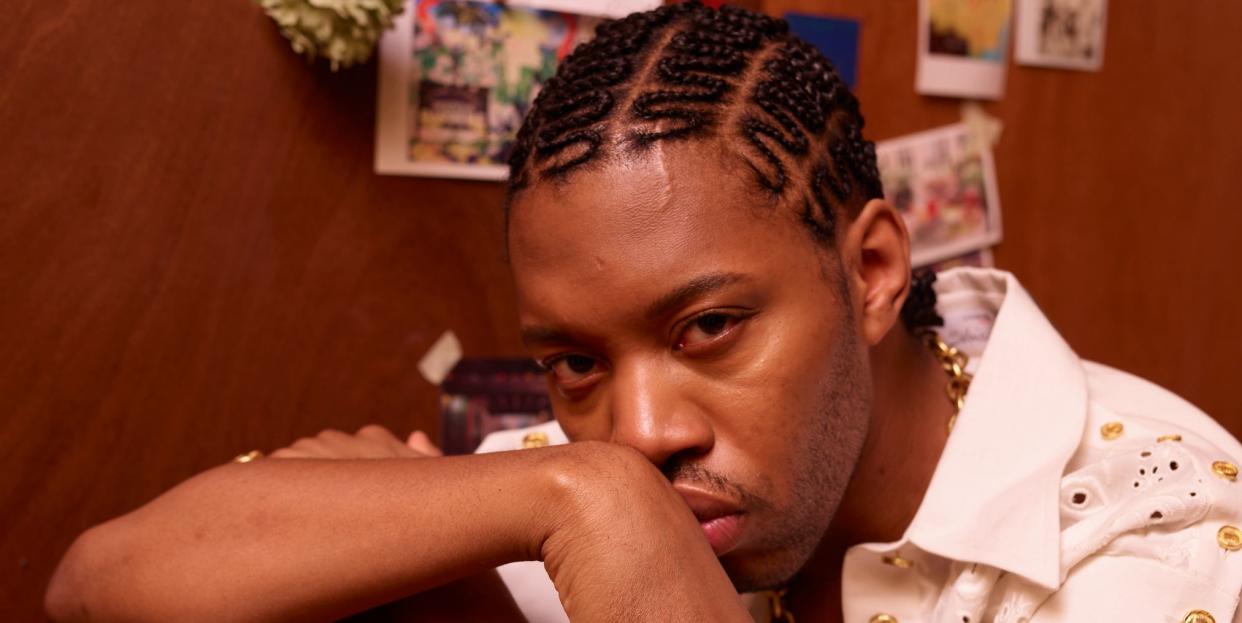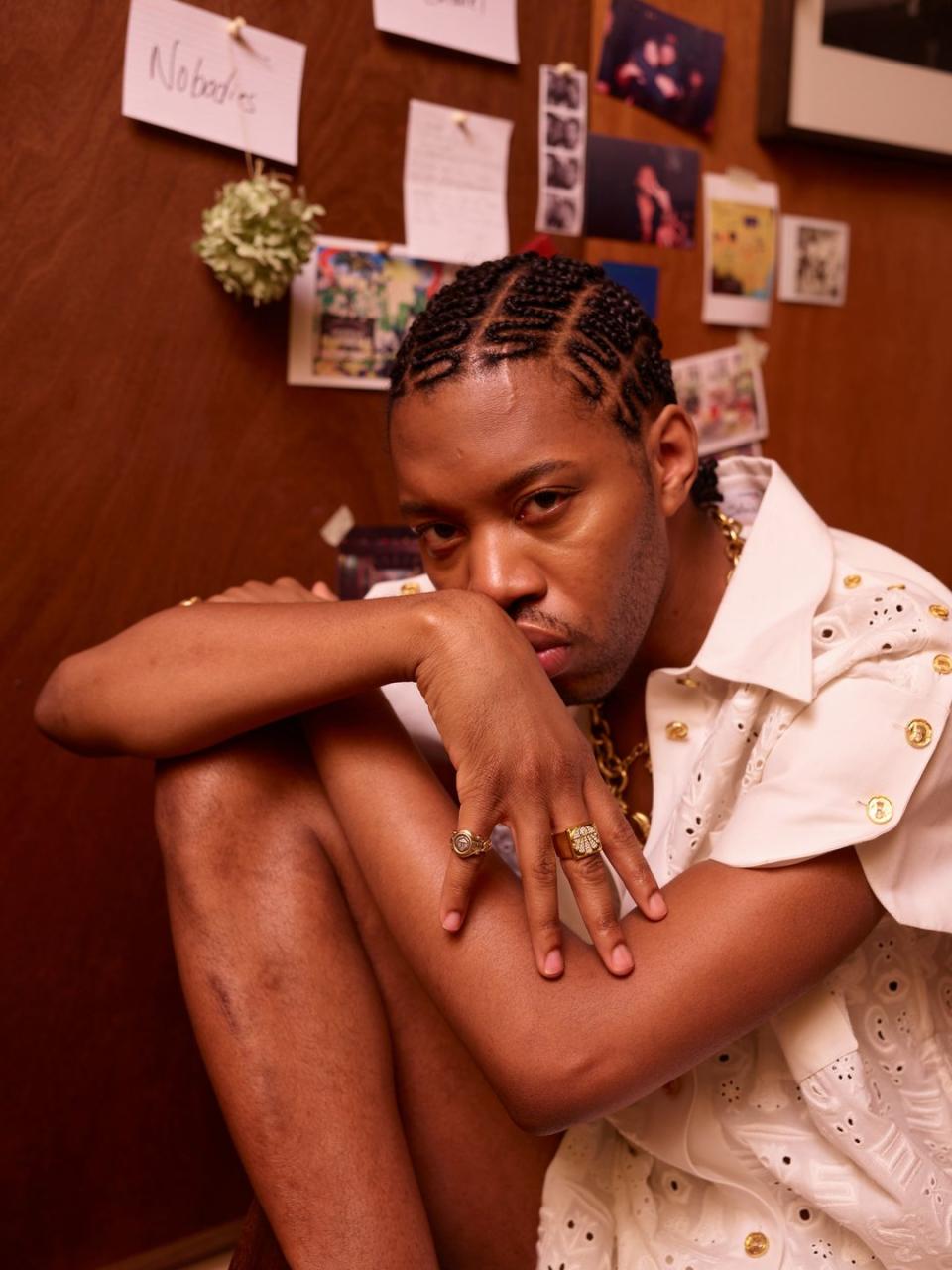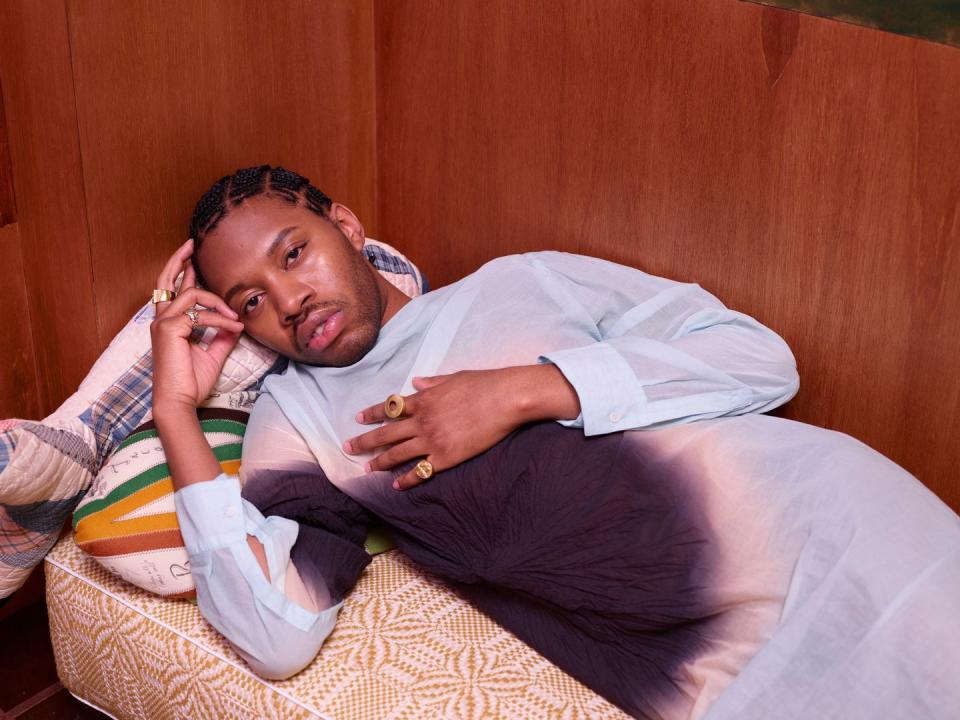Jeremy O. Harris at Home, Ready to Go


Where does Jeremy O. Harris go from here?
It’s a windy winter afternoon in New York, and the 31-year-old playwright is weighing his options in the snug, wood-paneled writing cocoon in his Lower East Side apartment. Before him is a vision board laying out upcoming projects on notecards—his next Broadway outing, film scripts, and TV series for his development deal with HBO. There are also affirmations and mementos ticking off his quick-fire rise over the past five years, including a note his mother gave him on his first day at Yale (along with $100, “a little something to grab a bite to eat. Love mom”) and an invitation to the 2019 “Camp” Met Gala. All are acknowledgments of the work he has put in, and the work that remains.
His custom walnut desk, too, is brimming—with the books of contemporaries and queer heroes lost too early to AIDS, like the British filmmaker Derek Jarman. “Remembering that my life could be as short as Derek Jarman’s or Sophie’s”—the music producer who recently died in an accident at 34—“is important, because anything can happen at any moment. I don’t want to leave this earth with any regrets, and not telling the stories I want to tell would be,” he says.
Then, with some relish, he pulls out a letter the Black playwright Alice Childress received in the 1950s informing her that her drama Trouble in Mind didn’t have enough commercial appeal. Sixty-six years after its off-Broadway debut, it’s finally coming to the Great White Way this winter.
“It’s another reminder to me that it will happen at some point, even if it doesn’t feel like it’s happening at the pace I want it to,” he tells me, referring to the proverbial “it”: the embrace of theater’s ancien régime, success beyond its confines, the realization of cherished artistic goals stretching back to Harris’s days at the Carlisle School in Martinsville, Virginia. Ambitious, impatient, and laser-focused, Harris would be the first to tell you he’s only at base camp as far as his career is concerned. Now, after a year waylaid by the pandemic, 2021 promises to shift his race against time into high gear.

Slave Play, the searingly funny, sexually frank production that brought him widespread acclaim (and some pearl clutching from the American Theatre Wing’s more conservative quarters), is up for a record 12 Tonys, whenever this year’s ceremony takes place (voting ends on Monday). Harris is helping to revitalize live entertainment at a moment of crisis as part of the council advising NY PopsUp, Governor Andrew Cuomo’s campaign to stage some 300 live performances at venues throughout the state, from February through Labor Day. And in June, Harris’s raucous debut screenplay, for the stripper road movie Zola, is expected to premiere, more than a year after its splash at the Sundance Film Festival. And that’s just what’s already in the can.
Slashing through the rest of the to-do list with his red marker will mostly take place in the postage stamp–size office carved out of the three-bedroom apartment he shares with a roommate at the historic Forward Building, a bohemian redoubt on East Broadway that over the years has been home to such disparate tenants as the namesake Jewish newspaper, Tatum O’Neal, and the filmmaker Spike Jonze.
Harris moved in in August 2019, just after he finished his master’s, taking over from a friend who works for Thom Browne, one of the fashion designers, alongside Telfar Clemens, Emily Bode, Daniel Roseberry of Schiaparelli, and Alessandro Michele of Gucci, who have enlisted his services as a model and ambassador. Harris was supposed to furnish the space last March, after his second play, Daddy, opened in London, but lockdown postponed the opening and trapped him in Europe. Ensembles are important to Harris, and when he came back to New York in December to a mostly empty outpost, he was energized to redecorate and rejoin his tight-knit social circle living in and around the budding creative diaspora known as Dimes Square.
“I get to live in a neighborhood where I have at least 20 friends I can name, like, off the top of my head, within walking distance,” he says.

Among them is the furniture designer Aaron Aujla, Bode’s partner in life and the founder, with Benjamin Bloomstein, of Green River Project LLC, a buzzy studio known for its artistic woodworking practice. Harris and Aujla’s first order of business was to create something like the MacDowell Colony in New Hampshire, where Harris finished Daddy. “A cabin separate from my phone, from a television, like I’m in my own fantasy world where the only thing I have to do is either read or write,” is how Harris describes it.
Which is not to say he is without company. He is surrounded by his muses: his mahogany bookshelves, a shrine to fellow playwrights as well as visual artists, including the woman who took these portraits for T&C, Mickalene Thomas. Looking down on the space is a poster for the 1967 documentary Portrait of Jason, about the sex worker and raconteur Jason Holliday. The scrapbook sensibility is not unlike the Instagram mixtapes Harris cobbles together out of internet detritus, except here the ephemera are drawn from his own life.
“I wanted to know when I came in to work that the people who had inspired me were here with me, rooting for me, because in many ways when I was writing, over the last couple months, I was writing alone,” he says.

When we meet, Harris is on the verge of finishing the first draft of a literary screen adaptation; its notecard is tacked onto a lauan wall next to another adaptation, of Brit Bennett’s hit novel The Vanishing Half; a TV series starring Laura Dern; and a talk show about the arts he’s calling It’s Culture. Oh, and then there’s a movie he wants to write in this cubby with the actress Hari Nef, which sounds as if it would make for a good play by itself.
“I think we will want to strangle each other, but that’s the beauty of it,” he says.
The clock is ticking, and Harris knows it’s a lot to take on, especially for someone who wasn’t trained as a screenwriter and is, he admits, undisciplined. That’s where this bespoke atoll comes in.

For six hours a day he’s glued to his desk, which is customized with its own ashtray for his American Spirit Blues, or on the daybed fitted with Bode upholstery, consorting only with his writing assistant over Zoom. “It’s like theater. You give yourself the façade and play the role, and maybe soon, if you practice every day, you’ll start feeling the real feelings,” he says.
Celebrity, he allows, has put an unexpected wrinkle in the proceedings. For someone who sees himself as a spy in the house of complacency that is American culture, suddenly finding himself in the spotlight, with both its extracurricular obligations and access to irresistible opportunities, is an adjustment.
“It was so much easier to write when I felt like I had something to prove and I needed someone to pay attention,” he says. “Now that everyone’s paying attention, it’s sort of like, ‘Leave me alone, can I just write over here?’ ”
Photographs by Mickalene Thomas and Racquel Chevremont, styled by Ryan Young
This story appears in the April 2021 issue of Town & Country. SUBSCRIBE NOW
You Might Also Like
